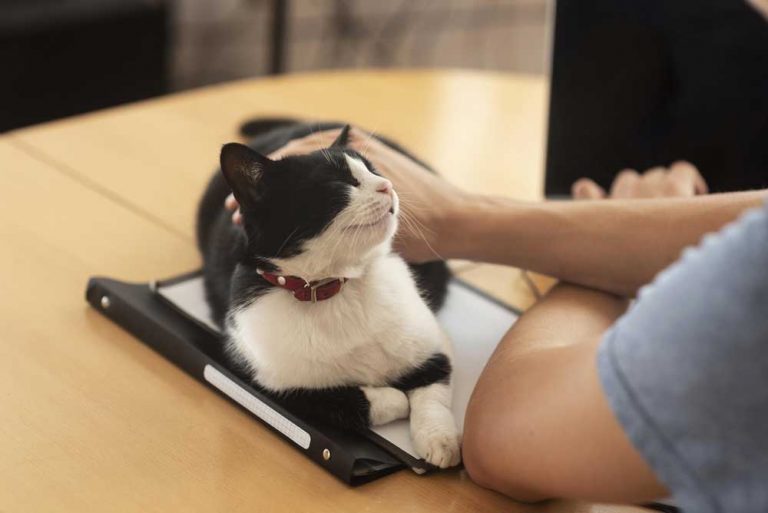Can I Take My Cat To The Vet Without Papers?
Key Takeaways:
- Most veterinary clinics require proof of vaccinations and ownership for cats before providing treatment.
- It is essential to have your cat’s medical records and proof of ownership when taking them to the vet.
- Failure to provide the necessary paperwork may result in the vet clinic refusing to provide treatment for your cat.
- Keeping your cat’s papers in order ensures smooth and efficient veterinary care for your feline companion.
Have you ever found yourself in a situation where your precious feline friend needs veterinary care, but you’re unsure if you can take them to the vet without any documentation? Well, I’m here to shed some light on this topic and put your worries at ease.
In this article, we’ll explore the importance of documentation for vet visits, the legal requirements surrounding it, and the common reasons why it’s needed.
But what if you don’t have the required papers? Don’t fret! We’ll also discuss the exceptions and alternative solutions.
So, let’s dive into the world of veterinary paperwork and ensure your kitty receives the best care possible.
Why Documentation is Important for Veterinary Visits
Documentation is essential for veterinary visits as it helps provide a complete medical history and ensures accurate treatment.
Additionally, it may be required by law in certain situations.
The Importance of Veterinary Records
Veterinary records are incredibly important for your pet’s health and well-being.
They contain vital information about vaccinations, medical history, and any ongoing treatments.
These records help veterinarians make accurate diagnoses and provide appropriate treatment.
They also ensure continuity of care if you switch veterinarians or move to a new area.
Veterinary records are crucial for monitoring your pet’s health, tracking any chronic conditions, and identifying any potential red flags.
By keeping up-to-date records, you are taking an active role in your pet’s healthcare and ensuring they receive the best possible care.
Legal Requirements for Veterinary Visits
Legal requirements for veterinary visits may vary depending on the country or state you reside in. However, there are some common regulations you should be aware of.
First, most places require all pets to have up-to-date vaccinations, such as rabies shots.
Second, some jurisdictions may mandate that you have a license for your pet. Lastly, it is generally important to keep a record of your pet’s medical history and any treatments received.
If you are unsure about the legal requirements in your area, reach out to your local veterinary clinic or animal control agency for guidance.
Common Reasons Documentation is Required
Common Reasons Documentation is Required:
- Identification: Documentation, such as proof of ownership or microchip registration, helps vets ensure they are treating the correct animal.
- Vaccinations: Proof of vaccination is required to establish your pet’s immunization status and protect both your pet and others from contagious diseases.
- Medications: Documentation allows vets to track previous medications and avoid prescribing harmful drug interactions.
- Medical History: Providing your pet’s medical history helps vets better understand their overall health and identify any chronic conditions.
- Travel: If you plan to travel with your pet, documentation, like health certificates or vaccination records, may be needed to comply with destination requirements.
- Legal Compliance: Documentation is essential to comply with various local, state, and federal regulations related to pet ownership and health.
- Insurance: Some insurance policies require documentation of your pet’s health and medical history to process claims effectively.
Remember, it’s always a good idea to keep your pet’s documentation organized and up to date to streamline vet visits and ensure the best care for your furry friend.
Exceptions to the Documentation Requirement
In certain emergency situations, you may be able to take your cat to the vet without papers.
If you already have an established relationship with your vet, they may waive the documentation requirement.
Emergency Situations
In emergency situations, it is important to prioritize your cat’s health. While documentation may be required in some cases, such as for travel or boarding, it should not prevent you from seeking immediate veterinary care.
If your cat is in distress or has sustained an injury, take them to the vet without hesitation.
You can handle any documentation or paperwork requirements later. Your cat’s well-being should always come first in emergency situations.

Established Relationship with the Vet
Establishing a good relationship with your vet is important for your pet’s health.
When you have a regular vet, they will have access to your pet’s medical history and can provide personalized care.
They will also be familiar with your pet’s behavior, making the vet visit less stressful.
Regular check-ups and preventive care will help keep your cat healthy and catch any potential health issues early on.
So, it’s a good idea to stick with one vet who knows your cat well.

Vaccination Records
Vaccination records are essential when taking your cat to the vet.
These records provide vital information about your cat’s immunization history.
Having up-to-date vaccination records helps ensure the health and safety of your cat, as well as other animals they come in contact with at the vet’s office.
Without proper records, the vet may not be able to provide the necessary treatments or preventive care.
It’s important to keep your cat’s vaccination records organized and readily available for vet visits.

What to Do if You Don’t Have the Required Papers
If you don’t have the required papers for your cat, there are a few things you can do to still take them to the vet.
Contact the Veterinary Clinic
To contact the veterinary clinic, simply find their phone number or email address and reach out to them.
You can usually find this information on their website or by doing a quick online search.
Give them a call or send them an email to discuss your cat’s situation and schedule an appointment.
They will be able to guide you on what to do next and provide the necessary information or paperwork they require.
Alternative Forms of Documentation
Alternative forms of documentation, if you don’t have the required papers for your cat, can be used to prove ownership and provide necessary information to the vet. These include:
- Photos of your cat: Having clear pictures of your cat can help establish ownership and identity.
- Microchip information: If your cat is microchipped, make sure to bring the relevant details to the vet.
- Adoption or rescue paperwork: If you adopted your cat from a shelter or rescue organization, bring any adoption documents that prove ownership.
- Vet records: If you’ve previously taken your cat to a vet, bring along any veterinary records or receipts.
- Affidavit: A notarized affidavit stating your ownership and relationship with your cat can also be considered as alternative documentation.
Remember, it’s always best to have the required papers for your cat, but if you don’t, these alternative forms can help ensure your furry friend gets the care they need.
Steps to Take for Future Veterinary Visits
For future veterinary visits, here are some steps you can take:
- Update your pet’s information: Make sure your contact details, address, and any changes in your pet’s health or behavior are updated with your vet.
- Schedule regular check-ups: Regular visits ensure your pet receives preventive care and vaccinations they need to stay healthy.
- Keep track of medical records: Maintain a file with your pet’s medical history, including vaccinations, medications, and any previous treatments or surgeries.
- Follow your vet’s recommendations: If your vet prescribes medication or advises a specific diet, follow their instructions closely for the best results.
- Ask questions: Don’t hesitate to ask your vet any questions or concerns you may have. They are there to help you care for your furry friend.
By taking these steps, you can ensure that your pet receives the best possible care during future veterinary visits.
Frequently Asked Questions
Can I take my cat to the vet without any prior medical history?
Yes, you can take your cat to the vet without any prior medical history.
Veterinary clinics are experienced in treating animals of all kinds, regardless of their medical records.
When you bring your cat in for a check-up or treatment, the vet will conduct a thorough examination to assess their health.
It’s helpful if you can provide any information about your cat’s history, such as vaccinations or previous health issues, but it’s not required.
The vet will work with you to determine the best course of action for your cat’s wellbeing.
So, don’t worry if you don’t have any papers or medical history for your furry friend – the vet is there to help!
What if my cat has never been to the vet before?
If your cat has never been to the vet before, it’s important to schedule a visit as soon as possible. Veterinary care plays a crucial role in ensuring your cat’s overall health and well-being.
During the first vet visit, the vet will conduct a thorough examination, check for any potential health issues, administer necessary vaccinations, and provide advice on diet, exercise, and parasite prevention.
It’s never too late to start providing your cat with the proper healthcare they deserve.
Can I take my cat to a different vet without papers?
Yes, you can generally take your cat to a different vet without papers. Vet clinics usually prioritize your pet’s care over paperwork.
However, it’s always helpful to bring any medical records or previous history you have, as it can assist the vet in understanding your cat’s health background.
Nevertheless, not having papers should not hinder you from seeking veterinary care for your furry friend. Just ensure you provide accurate information and communicate any concerns or observations you have about your cat’s health during the visit.
What information should I provide if I don’t have papers?
If you don’t have papers for your cat, there are still some key pieces of information you should provide when taking them to the vet. First, make sure to have your cat’s name and breed on hand.
Additionally, it can be helpful to provide details about any medical history or previous vaccinations your cat may have had.
If possible, provide information about your cat’s behavior and any recent changes in their routine or health. Lastly, provide your own contact information so that the vet can reach you if needed.
Will the vet still treat my cat if I don’t have documentation?
Veterinarians are still able to treat your cat even if you don’t have documentation. The most important thing is to be upfront and honest about your pet’s health history with the vet.
They will be able to provide care and make informed decisions based on the symptoms and condition of your cat.
Communication is key, so make sure to share any relevant information about your cat’s medical background to ensure the best care possible.
Final Verdict
While having documentation for your cat’s veterinary visits is important, there may be situations where you don’t have the required papers. In emergency situations, the focus will be on providing immediate care rather than paperwork.
However, for routine visits, it is best to establish a relationship with a veterinarian and keep a record of all vaccinations and treatments.
If you find yourself without the necessary documentation, contacting the veterinary clinic for guidance and exploring alternative forms of documentation can be helpful. Remember to take steps for future visits, such as keeping a personal record of your cat’s medical history.
Despite the absence of papers, a veterinarian will still treat your cat based on the information provided.
Veterinary visits are crucial for your cat’s health, so prioritizing regular check-ups and maintaining accurate records will ensure the best care for your furry friend.







